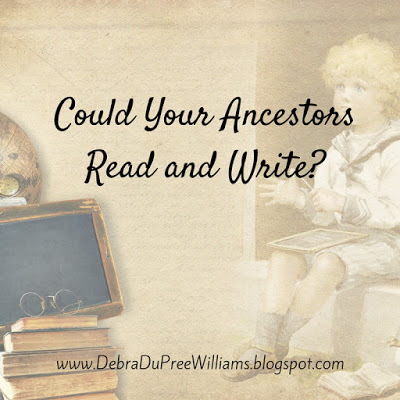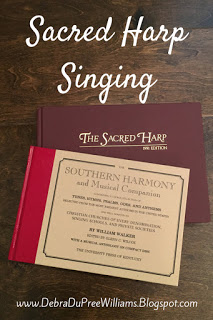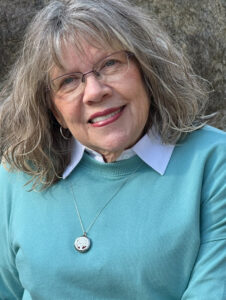Could Your Ancestors Read and Write?
By Debra DuPree Williams @DDuPreeWilliams
I’ve spent the past twenty years or so doing family searches. My search began in libraries, courthouses, and cemeteries. When Ancestry came along, I joined and began using their compilation of records for many of my searches. It wasn’t the cheapest way, but it was definitely the easiest.
Ancestry had online records such as census, wills, deeds—most of the things one would expect to find in doing genealogical research. Today, ancestry is much more comprehensive, offering not only these records but access to European records, passenger lists, and many newspapers from all over the world.
First Census of the US
Do you know when the United States instigated the first census? Go ahead and guess. If you said 1790, you would be correct. Then, census takers were assistant marshals. The questions were fairly basic, how many white persons male and female below and above age 16 were in the household, and how many slaves were in the household. Not pleasant questions, but a part of our nation’s past.
By 1830, the age categories were expanded greatly. This is the census in which social categories made their first appearance. Each household was asked about the number of free white males and females under five and all the way up to and over 100 years.
They asked about the number of slaves and free persons of color of both sexes but in much smaller categories, beginning with under ten years up to and over 100. They also asked for the number of white persons and slaves and colored persons who were deaf and dumb by age category.
1850, Many Changes
The 1850 census saw many changes. For instance, there were two questionnaires, one for free inhabitants and one for slaves. The same questions were asked of both groups, and for the first time, the names of all inhabitants were listed in the census record. New information included the profession or trade of each person, their place of birth, whether or not they had been in school in the past year. They also inquired about one’s ability to read and write.
Census records are not publicly released until seventy years later. We got our first peek at the 1940 census in 2010 and we won’t see the 1950 census until 2020. Many of my generations will find themselves in census records for the first time.
You can see that the census records will show you many things that you may not have ever considered about your ancestors. Maybe you haven’t thought about these things in terms of aunts and uncle or cousins, but do you know if your grandparents and great-grandparents could read and write? These days, we can’t imagine that they wouldn’t have learned to read and write. Odds are, they didn’t necessarily have these skills. The census record will tell you.
My own grandfather DuPree couldn’t write when he married my grandmother, or so the family story goes. Grandmother was a schoolteacher and she taught Granddaddy to write. He could read, but he couldn’t write. Granddaddy became a surveyor and a carpenter.
Surprises
One surprise learned only a few months ago, is that my mother’s father, born in 1858, could read and write. How in the world he learned those skills is beyond my sister and me. Think about the fact that he was born just a couple of years prior to the outbreak of the Civil War. He was in south Alabama—war-torn Alabama. (Note here: Yes, I do mean my grandfather was born in 1858. He was thirty years older than my grandmother when they married.)
An even bigger surprise to us is that Grandpa Bass could read music and was a leader of the Sacred Harp gatherings. Believe me when I tell you that this was a huge surprise. No one in our family had ever told Sis and me about this, and I am sure they knew. Why they didn’t share this information with us is a mystery.
If you are like Sis and me and your parents and your grandparents have all gone on to Glory, you can consult old census records for answers to some of these questions. But if those records don’t tell you what you want to know, don’t forget to check local newspapers which is how we learned about Grandpa’s connection to the Sacred Harp community. A cousin was browsing through old newspaper articles and came upon a couple about Grandpa and Sacred Harp singings.
I’d like to suggest that you write the story of your life and that of any ancestors you knew. Leave this behind so that the next generations will have a written record of who you and other ancestors are. If you will look at my past blog posts, you will find a set of three questionnaires to take with you to any family reunions or gatherings. They will be a great starting point in learning about your family’s past. But let me warn you, being bitten by the genealogy bug is a life-long love affair. Once you’ve opened that door, you won’t be able to stop.
Do you know all of these things about your ancestors? Check out census records and old newspapers and share your findings with us.
TWEETABLE



The Conversation
Yes many of my ancestors could read. I like the 1910 census because it is the only one that ask for the number of children a mother had and how many are still living.
Have you seen the 1940 census. My TN family cannot be found on it. I wonder if it had to do with my father's job? Janie